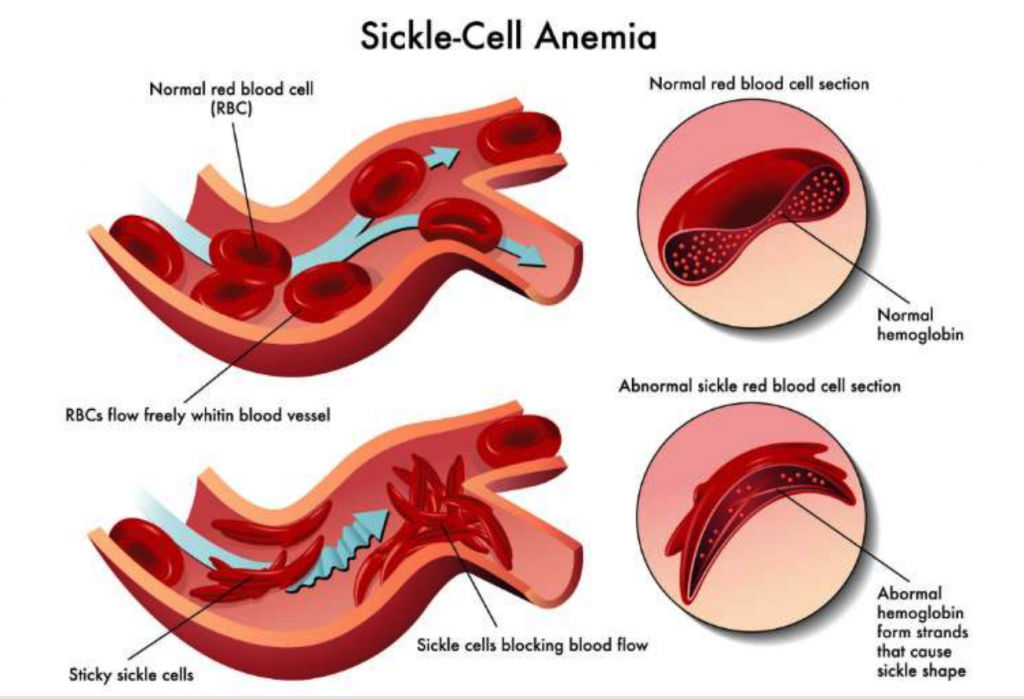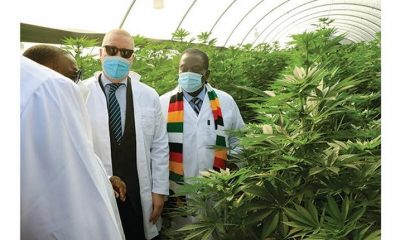The use of cannabinoids in the chronic pain of patients with Sickle Cell Anemia and the topical application of cannabinoids in the respective ulcers. Analysis of two clinical trials.
By Soraia Tomás (Nurse)
Sickle cell anemia is a genetic hematological disease characterized by the production of abnormal erythrocytes (red blood cells). It especially affects individuals descended from populations of North Africa and the Mediterranean, who have a small number of normal red blood cells and a large number of defective red blood cells. The latter are characterized by their sickle shape and have little elasticity compared to normal red blood cells which, in addition to being quite malleable, resemble a swimming pool float.
The defective form of red blood cells in individuals with Sickle Cell Anemia, in addition to carrying less oxygen, has a short life span: 20 days, in contrast to the approximately 120 days of a red blood cell with normal characteristics. The spleen, the organ responsible for the degradation of defective cells, is overloaded in cases of Sickle Cell Anemia, which causes several complications, since this organ is also involved in the regulation of the immune system. For this reason, in addition to being more susceptible to anemia (due to a high rate of degradation of red blood cells by the spleen compared to those produced by the bone marrow), the immunity of these individuals is also compromised, which favors the onset of infections such as meningitis and pneumonia, the latter being the major cause of death in patients with Sickle Cell Anemia.
The lack of elasticity of these cells compromises blood circulation, causing obstruction of small vessels and triggering vaso-occlusive crises that occur mainly in the chest, abdomen and limbs. When these obstructions occur in larger vessels, they affect internal organs, potentiating the occurrence of serious complications such as acute myocardial infarction, renal failure, stroke, thrombosis of the lower limbs and limb ischemia, with consequent formation of ulcers.
Bone marrow transplantation is the only form of effective treatment and is not feasible for most patients. Currently, the only option is to control symptoms and prevent complications, and, in addition to adequate hydration, these patients are subject to several blood transfusions throughout their lives and are medicated with hydroxycarbamide, a drug that acts by reducing the percentage of sickle-shaped cells in the blood.
With this treatment plan, it is possible to drastically increase the average life span of these patients, with many of them reaching adulthood.
In adulthood, these patients are at a high risk of developing ulcers in the lower limbs, due to small vessel thrombosis, which promotes endothelial dysfunction, inflammation, ischemic injury and associated tissue necrosis. Ulcers in individuals with sickle cell anemia are difficult to treat and are usually associated with significant pain, disability and a major psychosocial and economic impact.
The effectiveness rate of treating this type of ulcer is dismal, as there is no effective standard therapy. In most of the experimental studies carried out, chemical components such as sodium nitrite and the RGD peptide are used, which, in addition to not showing great efficacy, have a great carcinogenic potential.
How do cannabinoids work in this disease?
The endocannabinoid system is a complex cellular communication system spread throughout the body of mammals and vertebrates. The signaling of this system transcends the classic cannabinoid receptors involving not only surface membrane receptors (TRPV, GPR, 5-HT) but also nuclear receptors (PPAR). The deregulation of this system is implicated in the pathophysiology of changes in the integument and wounds.
Topical cannabis-based medications (containing cannabinoids, terpenes and flavonoids) are emerging as potential new treatments for skin disorders and wounds, facilitating absorption, decreasing inflammation and promoting healing.
The first randomized, placebo-controlled clinical trial of inhaled (vaporized) cannabis in patients with Sickle Cell Anemia and chronic pain was published in June 2020. This study was conducted at the Clinical Research Center of the Institute of Clinical Sciences and University of California Translational Hospital located at San Francisco Zuckerberg General Hospital. Conducted by Donald I. Abrams evaluated the therapeutic potential of the administration of vaporized cannabis, used as an adjunctive treatment in adult patients with chronic pain derived from Sickle Cell Anemia.
It is mentioned in this study that cannabis use is substantially higher in patients with Sickle Cell Anemia compared to the general population. In the US, of the 33 states that authorize the use of medical cannabis, only 4 have regulated it as a treatment for Sickle Cell Anemia.
The results obtained in this clinical trial suggest that cannabinoid-based treatment is well tolerated by most patients, it does not significantly reduce the level of pain, but improves mood. No significant adverse effects were reported during the course of this trial, particularly when compared to other pharmaceuticals used to control pain, such as opioids.
Another study, published in December 2020, conducted by Dr. Vincent Maida, President and CEO of VinSan Therapeutics Inc., demonstrated the therapeutic potential of topical application of cannabis-based products to patients with ulcers resulting from Sickle Cell Anemia.
In this clinical trial with 33 patients with unhealed refractory cutaneous wounds, an improvement in the healing process was observed in about 90% of the cases, and the duration of treatment depends on each patient. The results observed in this study highlight the therapeutic potential of topical treatment based on cannabinoids in this pathological condition, being a non-invasive option that does not cause adverse effects.
The results obtained in the two aforementioned studies reveal the therapeutic potential of cannabinoid-based treatment in patients with Sickle Cell Anemia and underline the importance of encouraging further research and future investigations in this area.
____________________________________________________________
*Soraia Tomas is Nurse, graduated from the Nursing School of Coimbra in 2015. Worked in intensive care of Cardio-Thoracic surgery and lung transplantation in Lisbon. She currently works at the Spine Center, a spine surgery service and an intensive care unit for general surgery at Hospital da Luz in Coimbra, the city where she lives. Enthusiastic in the field of Medicinal Cannabis, he is a member of the scientific council of the Portuguese Observatory of Medicinal Cannabis, attended conferences in this area (Portugal Medical Cannabis, Cannabis Europa, CannX, among others) and obtained a postgraduate degree in GMP's for Medicinal Cannabis, course carried out by the Portuguese Observatory of Medicinal Cannabis in partnership with the Military Laboratory of Chemical and Pharmaceutical Products and the Faculty of Pharmacy of the University of Lisbon. President of the Board of Apcanna – Portuguese Association for Information on Cannabis, intends to develop projects dedicated to the dissemination, education and training in medical cannabis to health professionals and the general public, thus promoting excellence in professional practice and safe and effective access to cannabinoid therapies.












































